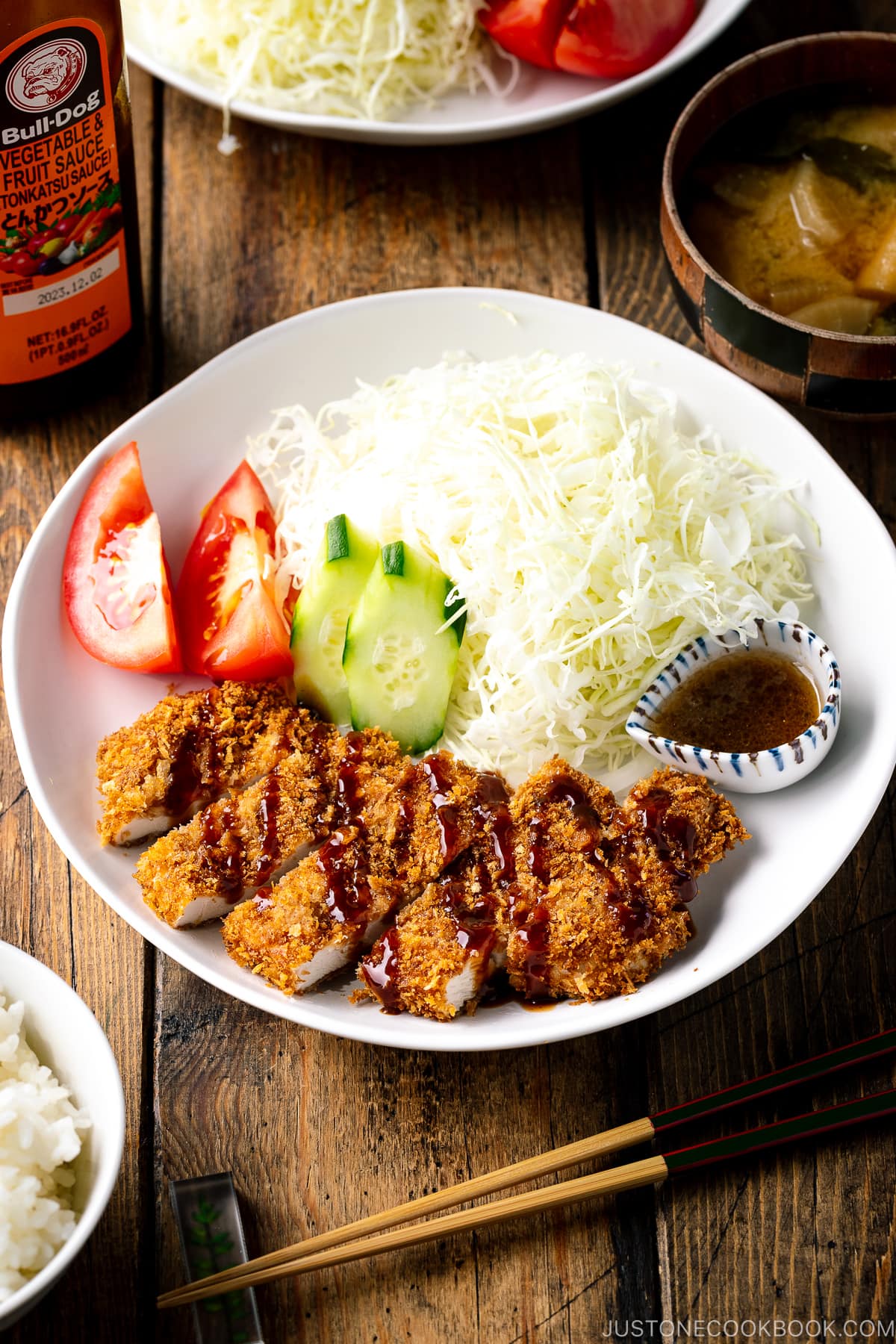
Baked Chicken Katsu (揚げないチキンカツ) is my go-to healthy spin on the Japanese classic. By toasting panko first and baking on a wire rack, you get the same crunchy outside and succulent inside without the oil splatters.
If you love Japanese panko-breaded foods, try my Tonkatsu, Japanese Croquettes, and classic Chicken Katsu recipes next!
Table of Contents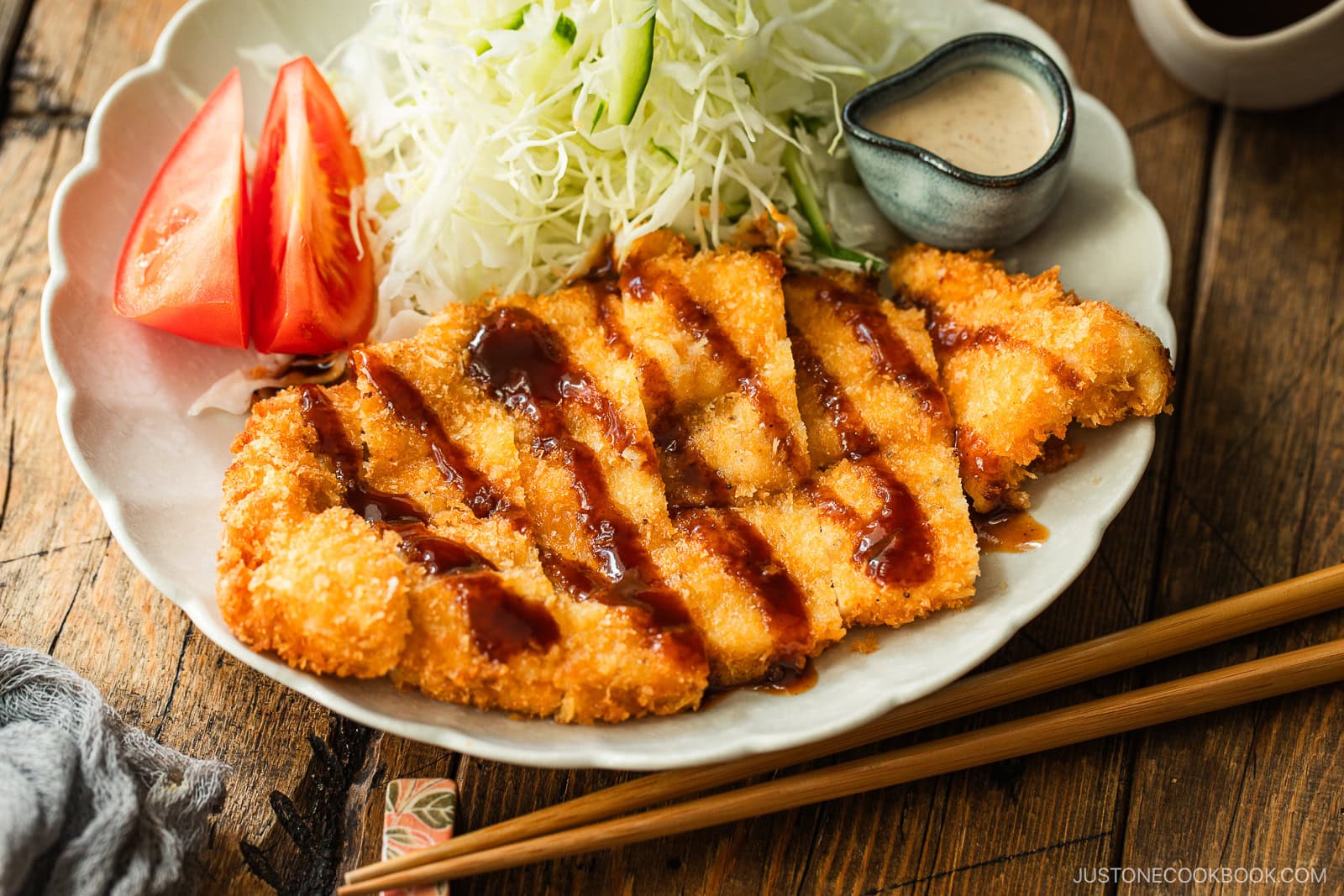
What is Katsu?
Short for katsuretsu or cutlet, katsu (カツ) is Japan’s answer to schnitzel. Traditional cutlets are deep-fried, but in this baked chicken katsu recipe, we butterfly chicken breasts, coat them in pan-toasted panko Japanese breadcrumbs, and bake until crispy. The result is lighter and just as satisfying as the deep-fried version.

Why I Love This Recipe
- Pan-toasted golden crust that’s super crispy
- Tender and juicy interior
- A lighter, healthier option than the deep-fried version
- Easy cleanup and no deep fry mess!
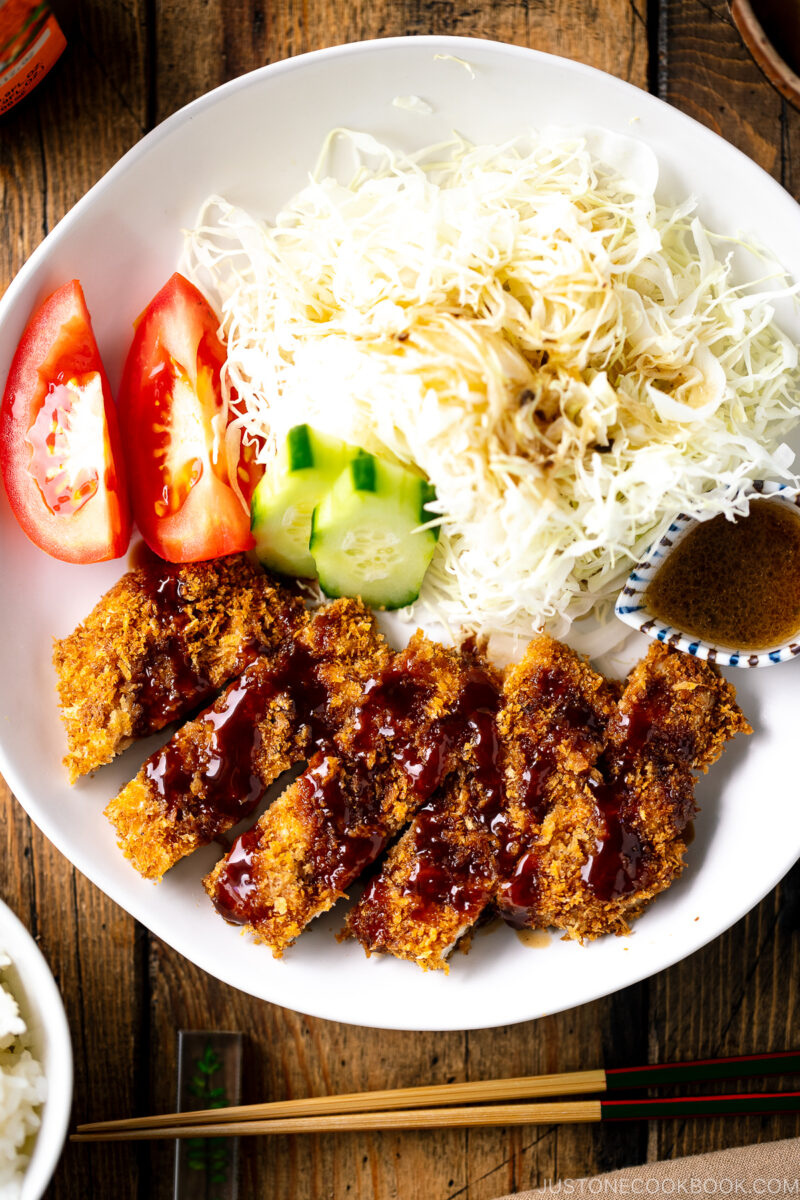
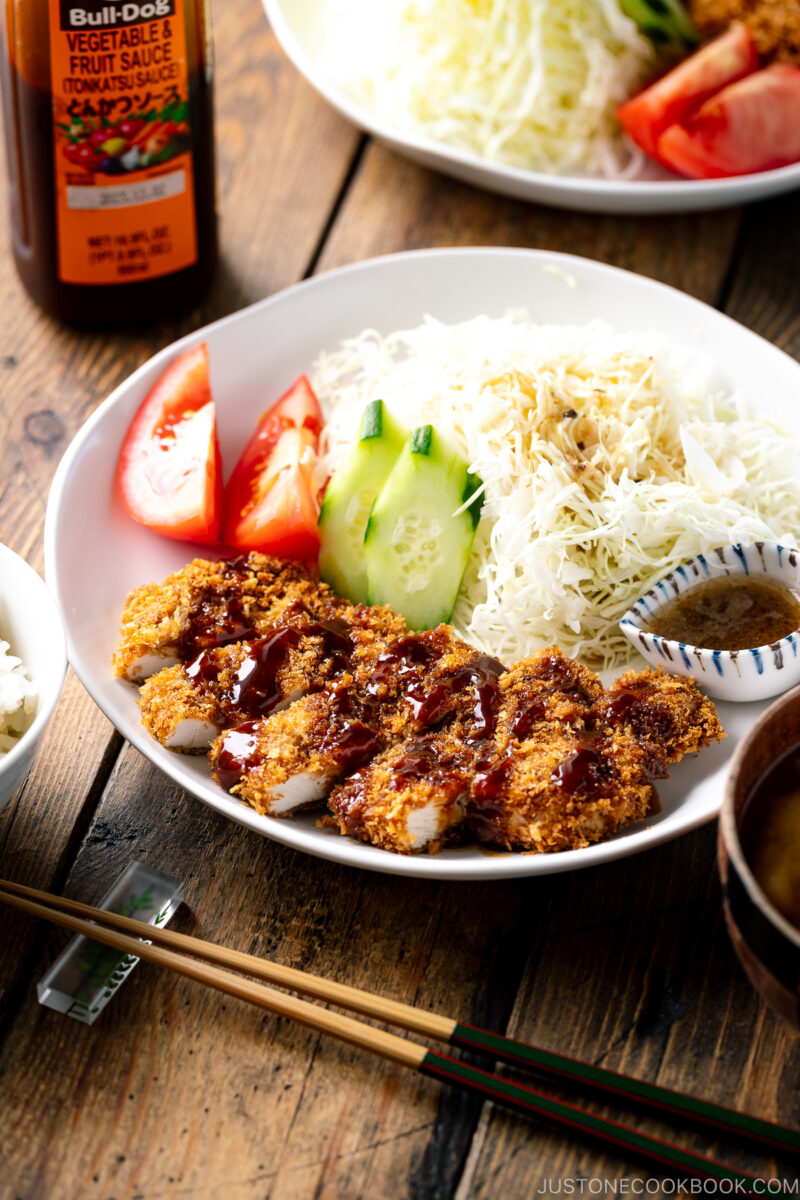
Ingredients for Baked Chicken Katsu
- Chicken breasts – boneless, skinless
- Panko (Japanese breadcrumbs)
- Large egg
- All-purpose flour
- Kosher salt and freshly ground black pepper
- Neutral oil
- Tonkatsu sauce
Find the printable recipe with measurements below.
Jump to RecipeSubstitutions
- Panko: I use flaky panko breadcrumbs for their light, fine, and supercrisp crunch. Please use a Japanese brand, as non-Japanese panko is not the same.
- Chicken breast: Please do not substitute chicken thighs, which have more fat and take longer to cook.
- Tonkatsu sauce: We use this thick, sweet-savory sauce for all katsu dishes. The most famous brand is Bulldog, but I prefer to make Homemade Tonkatsu Sauce with Worcestershire sauce, oyster sauce, and ketchup because it’s easy and just as delicious.
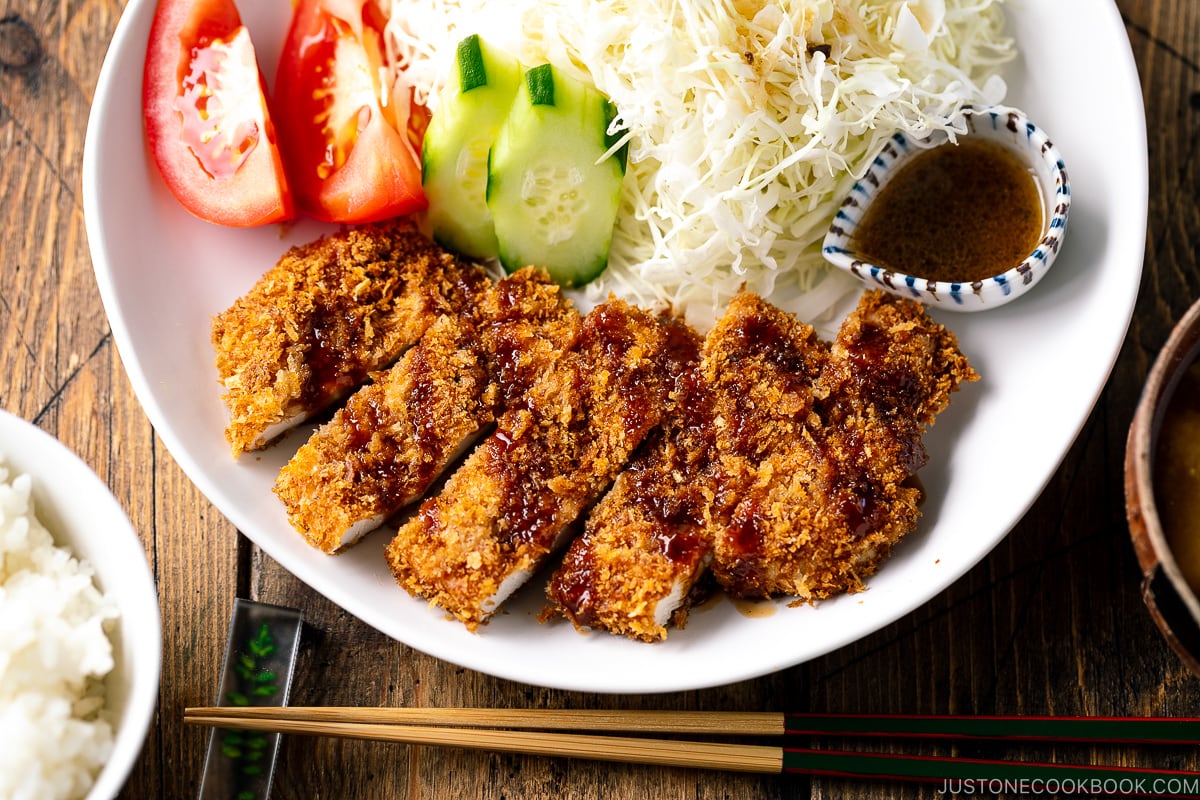
How to Make Baked Chicken Katsu
Preparation
- Toast the panko in a dry frying pan until golden brown; cool.
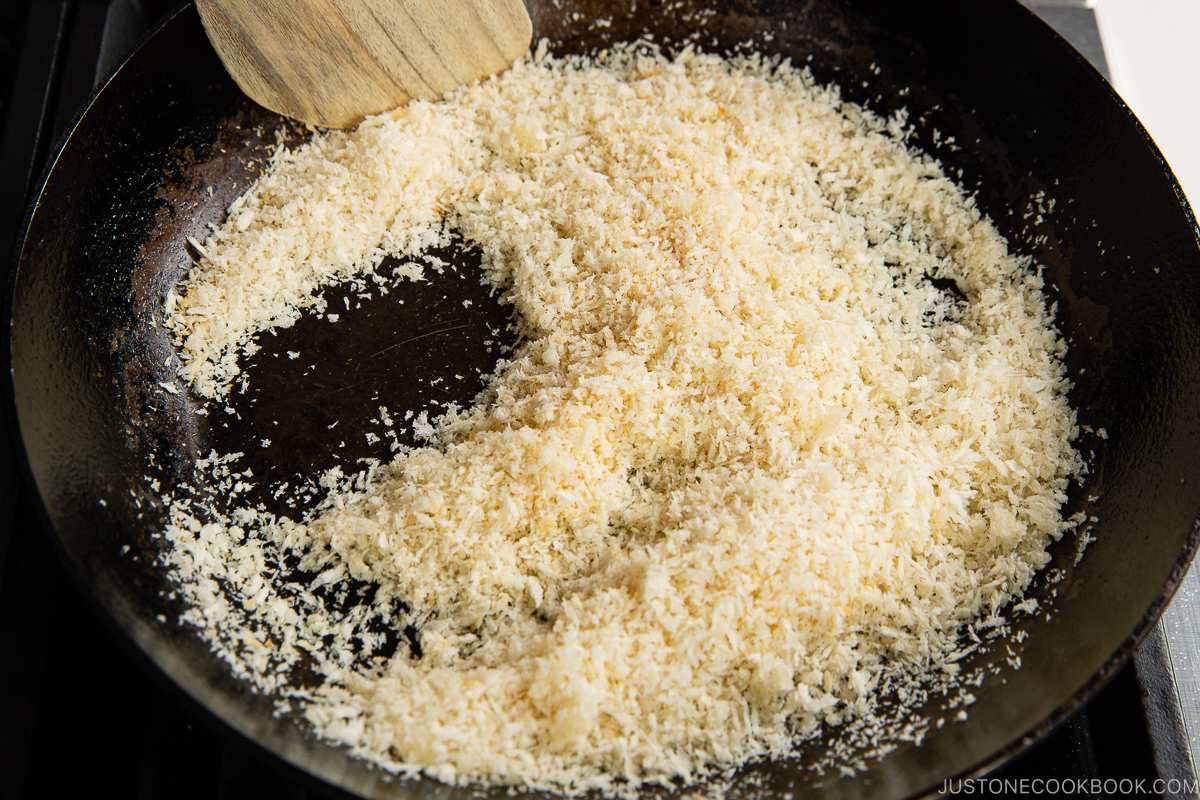
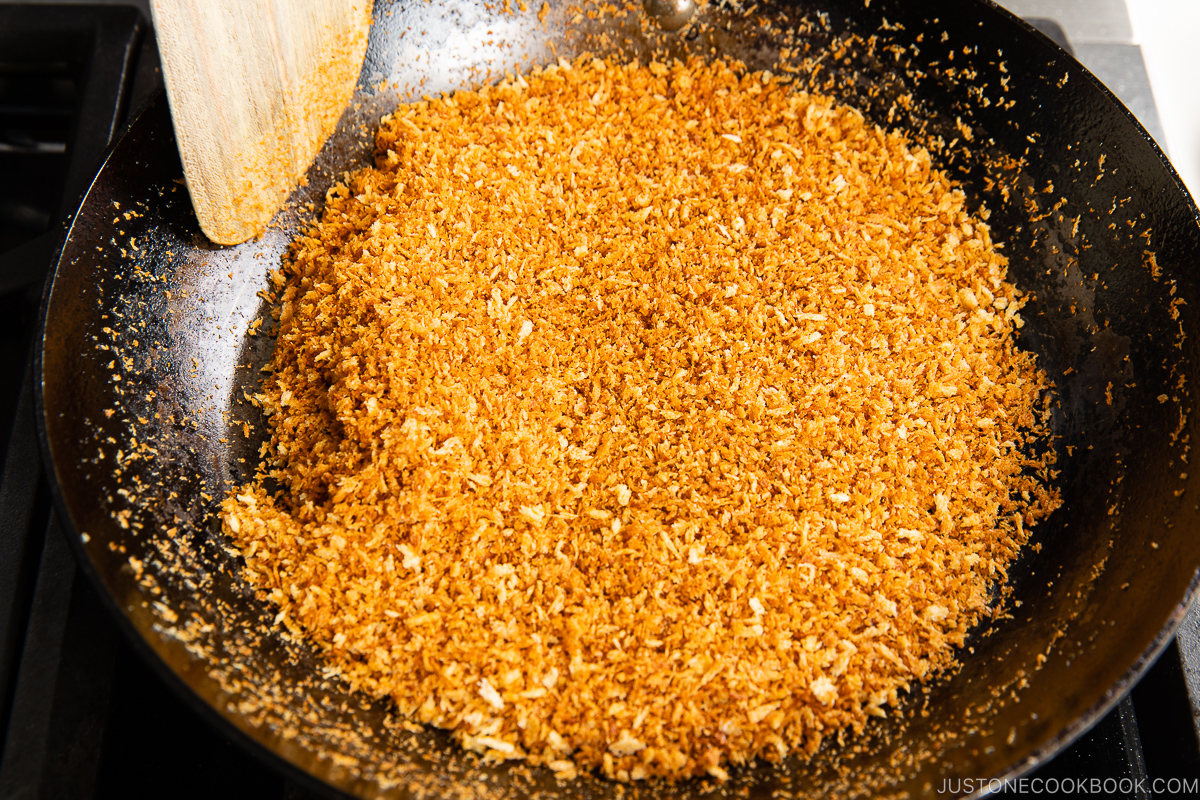
- Butterfly each chicken breast or use the Japanese Kannon biraki method. Season with salt and pepper.
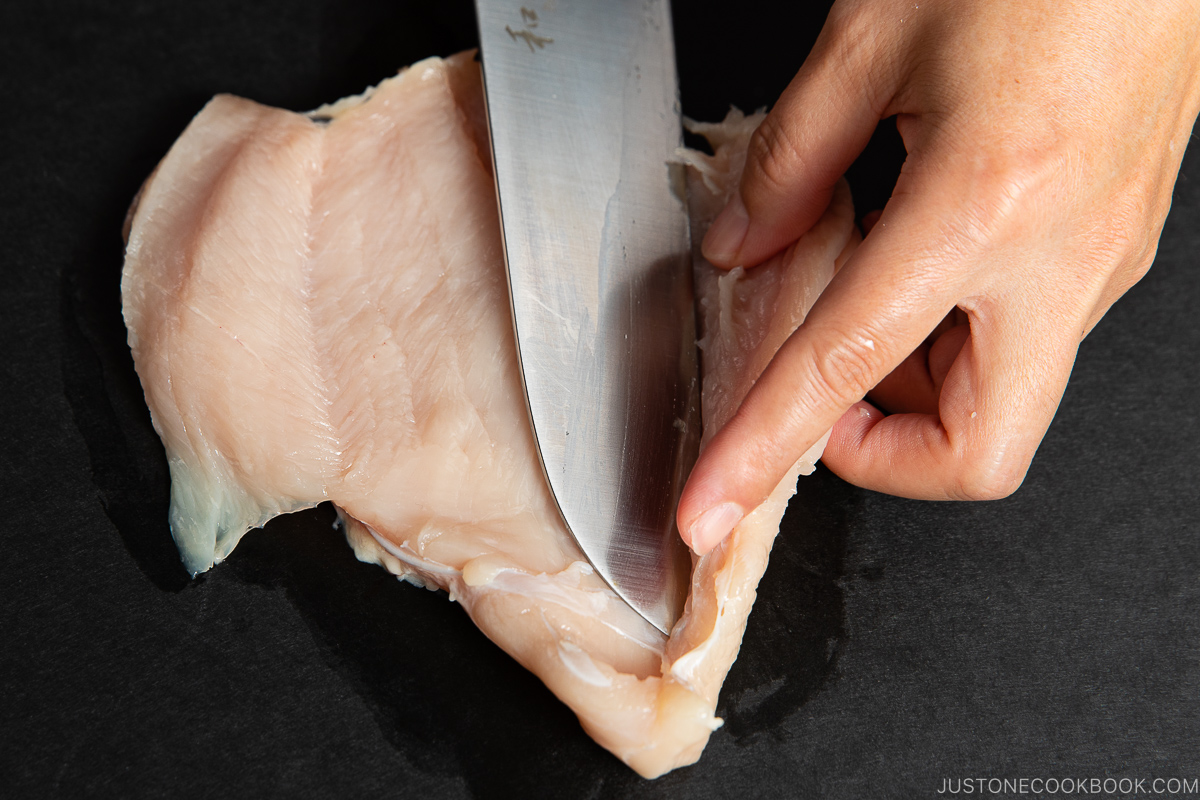
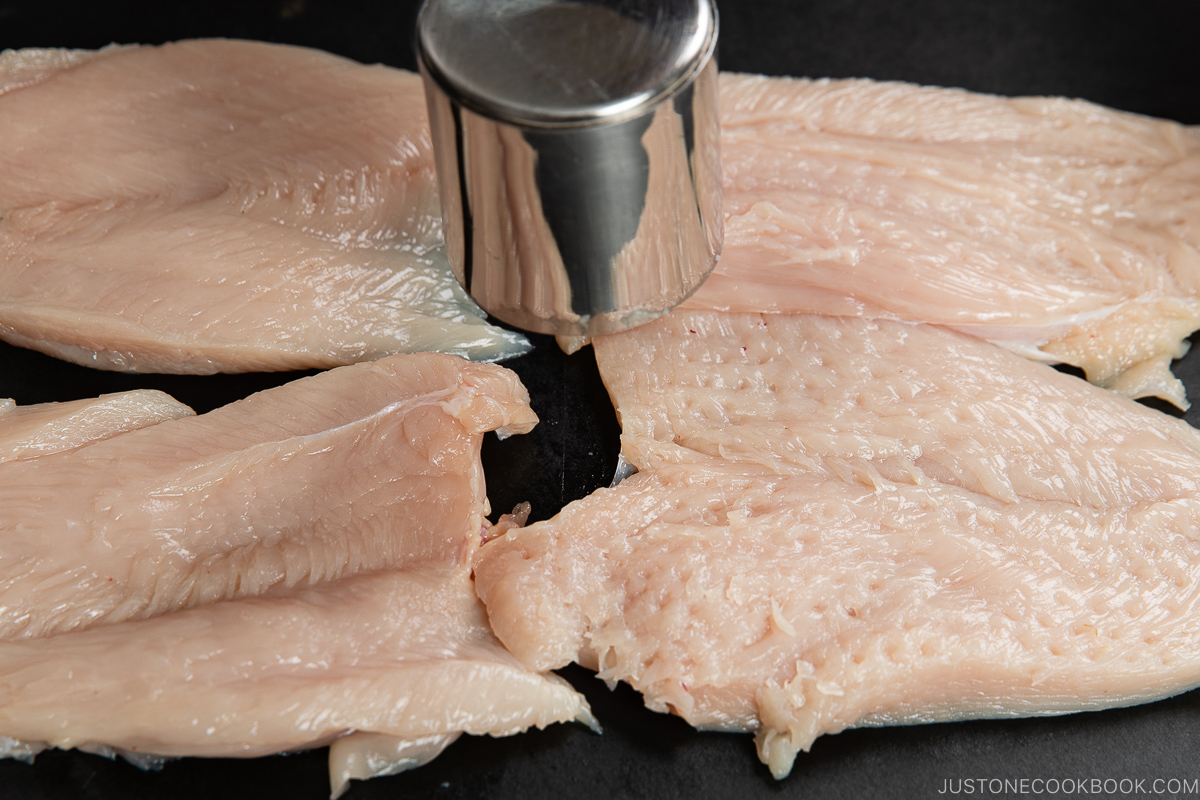
- Bread the cutlets. Set up prep trays with flour, beaten egg with oil, and toasted panko. Coat the chicken.
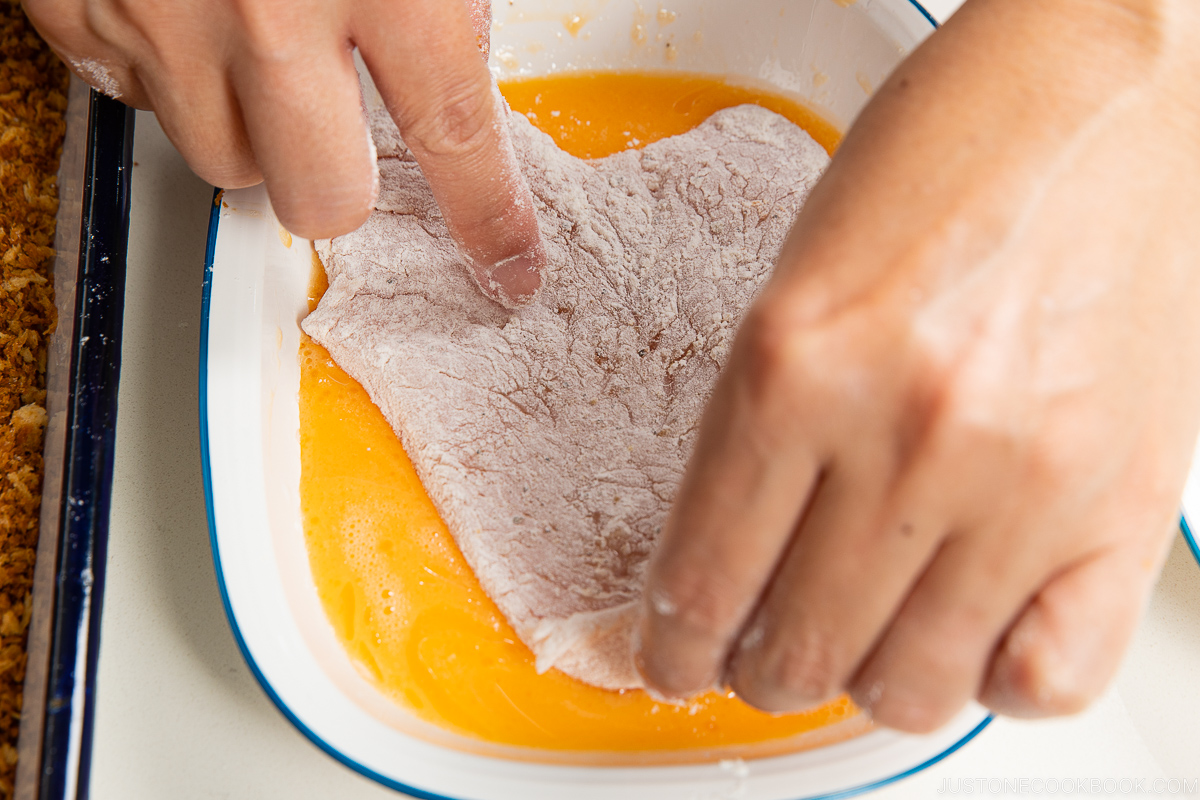
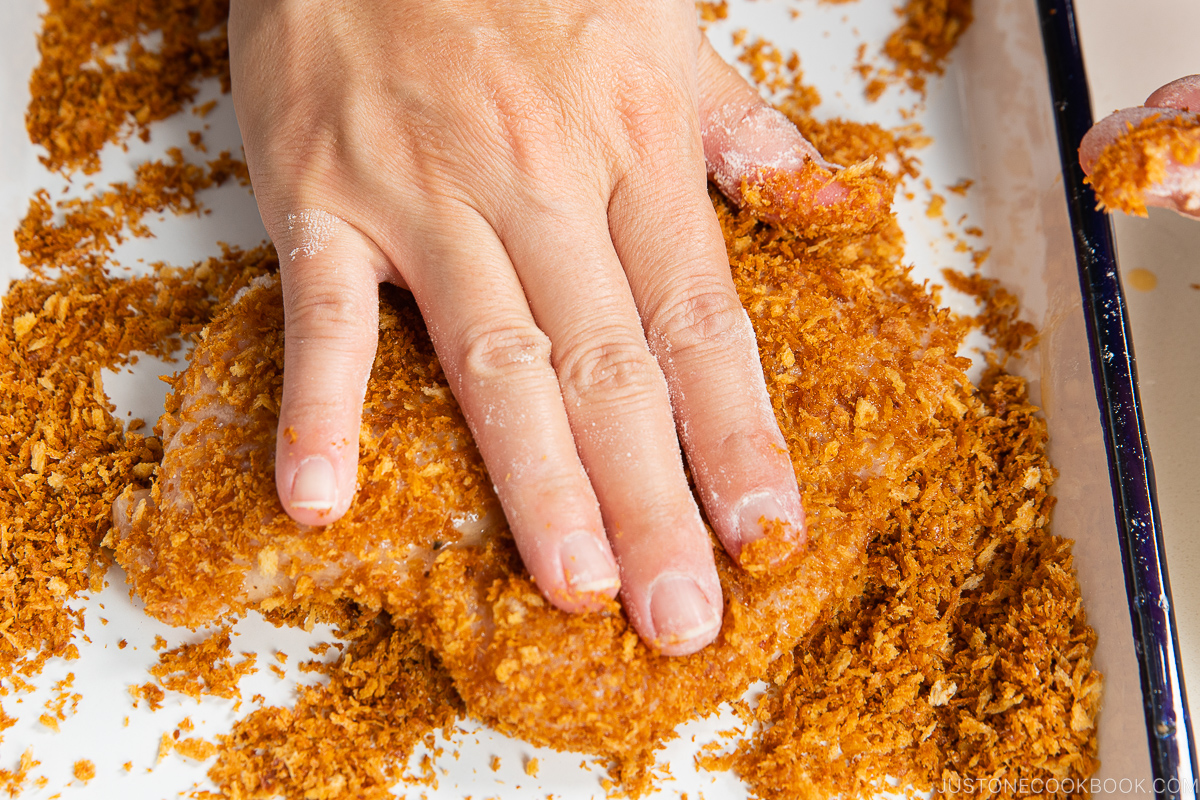
Baking
- Bake. Place cutlets on a wire rack set over a rimmed sheet pan. Bake at 400ºF (200ºC) for 25–30 minutes, or to an internal temperature of 165ºF (74ºC).
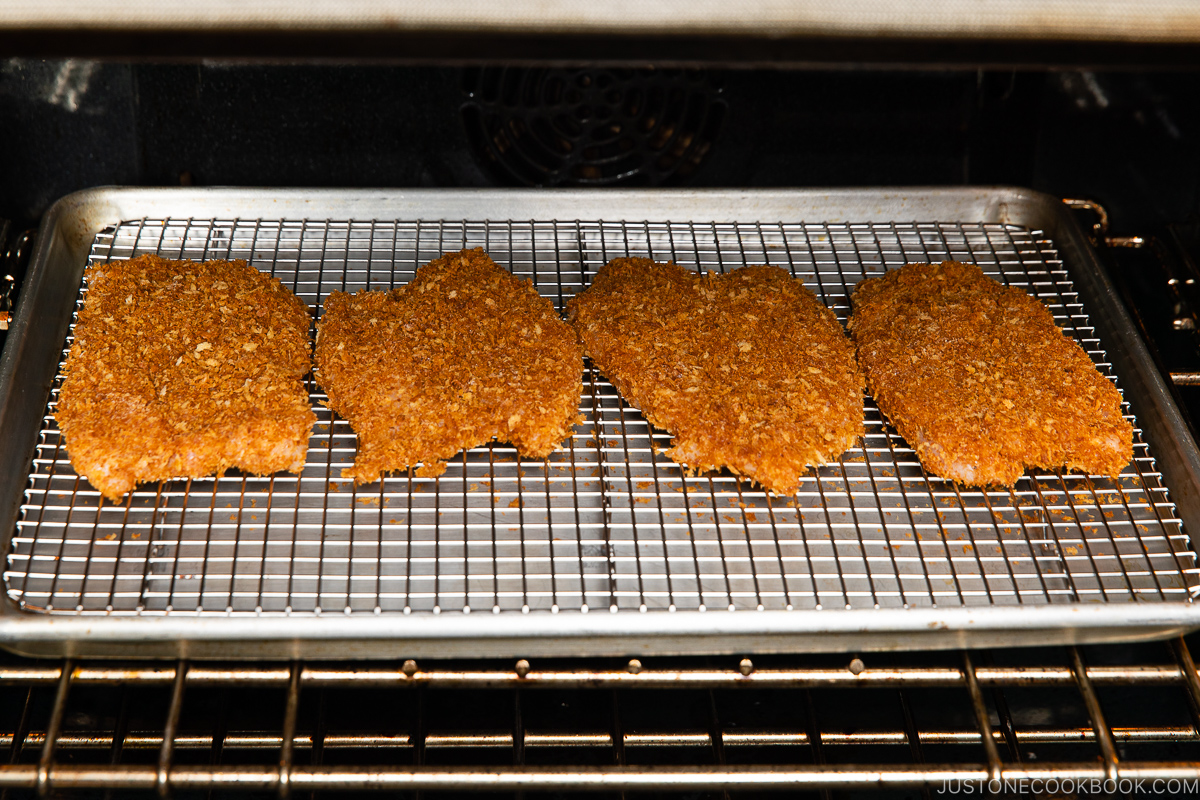
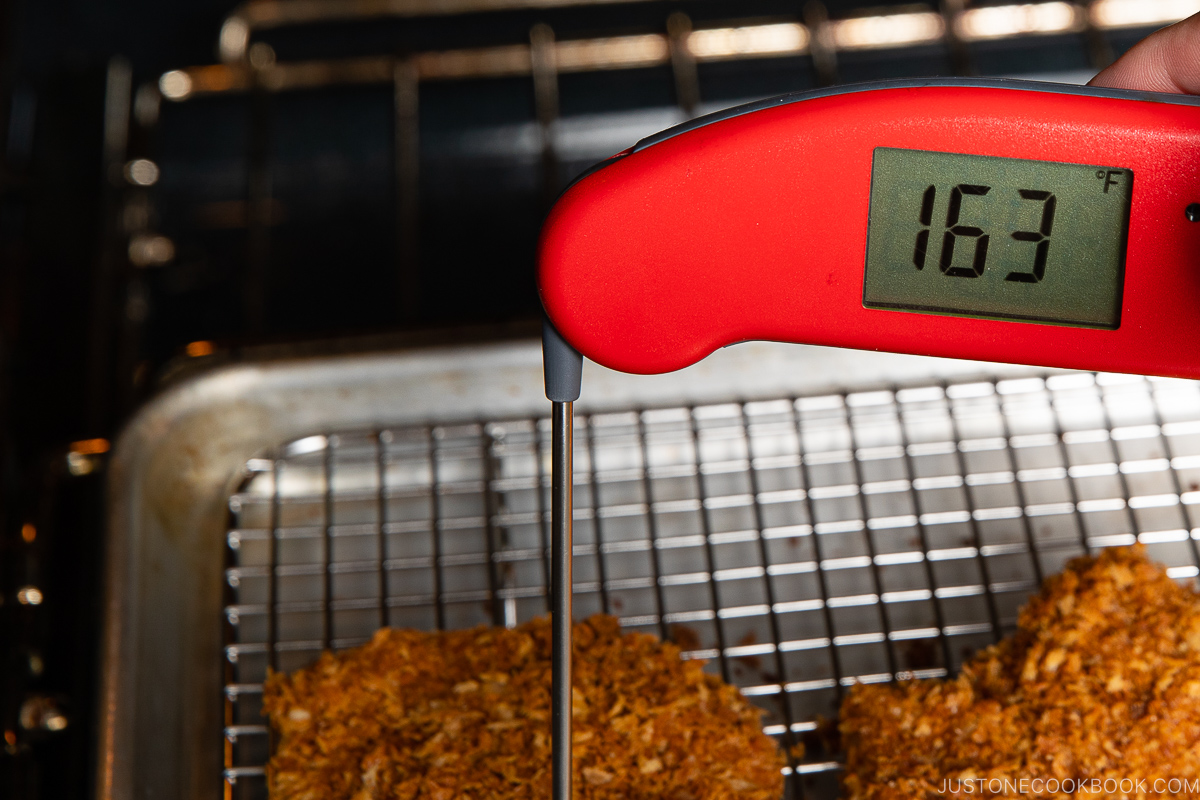
Assemble
- Cut and serve. Slice the cutlets into ¾-inch (2-cm) pieces and serve drizzled with tonkatsu sauce.
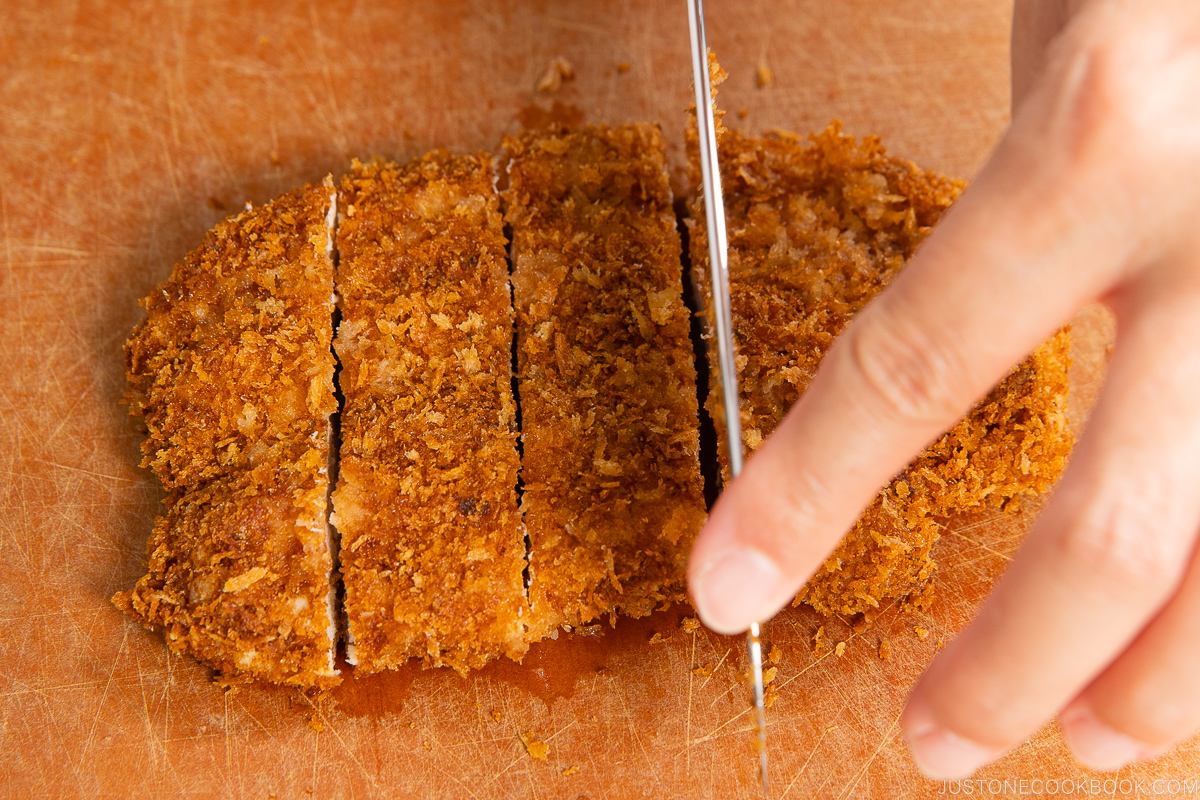
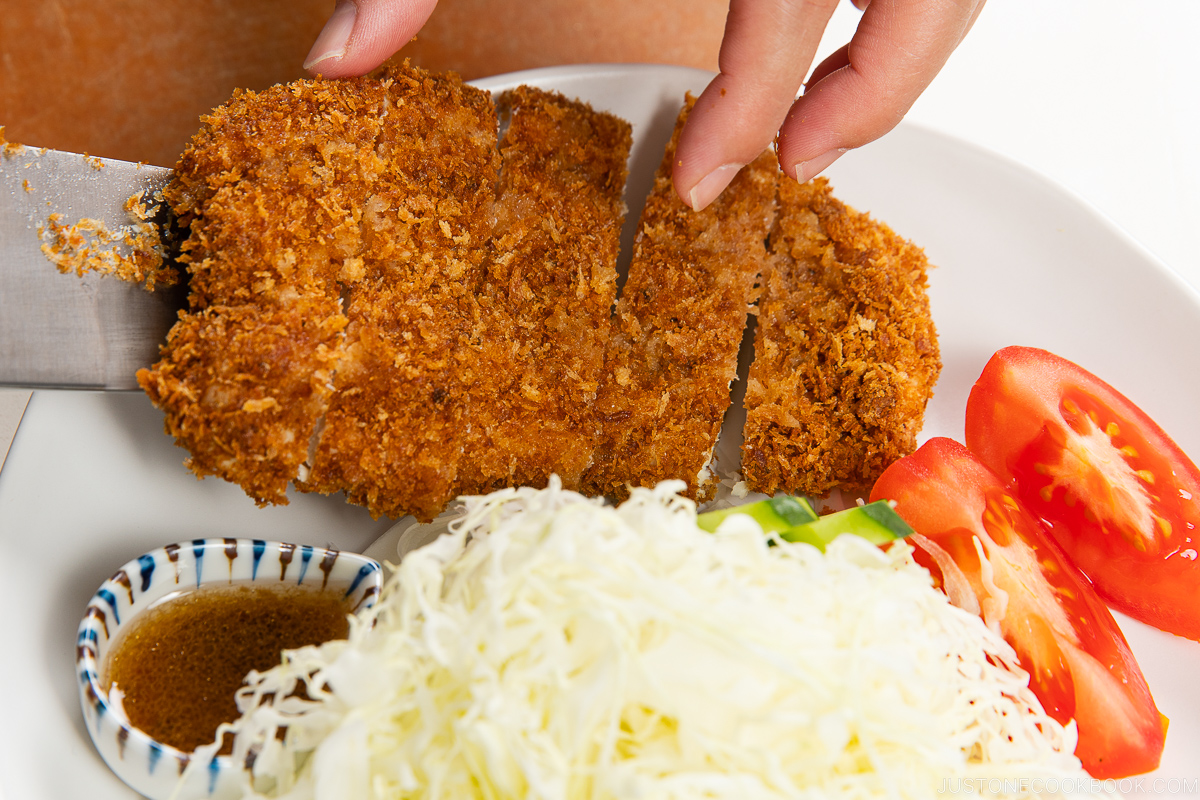
Nami’s Recipe Tips
- Toast the panko first so it bakes up evenly brown and extra crispy.
- Butterfly for juiciness – Thin, even cutlets cook fast and stay moist.
- Add a teaspoon of oil to the egg to help the crumbs stick better.
- Use a wire rack so hot air reaches every surface—no soggy bottoms.
- Check doneness with an instant-read thermometer like Thermapen ONE from ThermoWorks; overbaked breast dries out quickly.
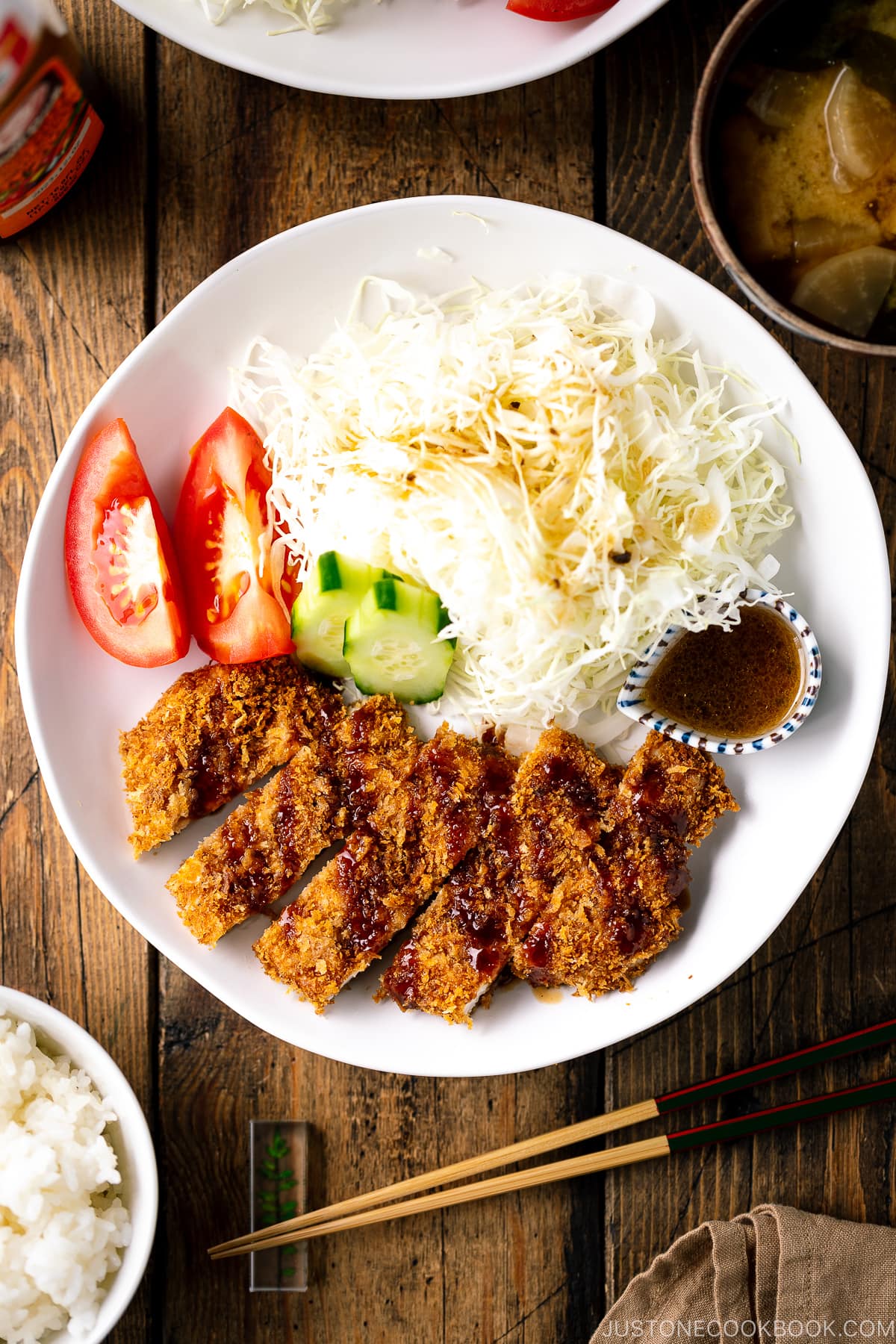
Variations and Customizations
- Make it with pork with my Baked Tonkatsu recipe.
- Grind toasted sesame seeds and stir into tonkatsu sauce for a nutty dip.
- Use it in curry rice. Lay leftover cutlets over rice with Japanese curry for Chicken Katsu Curry.
- Make chicken katsu sando. Tuck the chicken cutlets between fluffy Japanese milk bread (shokupan) for a chicken Katsu Sando.
- Serve it in a rice bowl – Simmer katsu with onions and egg to make my favorite donburi, Katsudon.

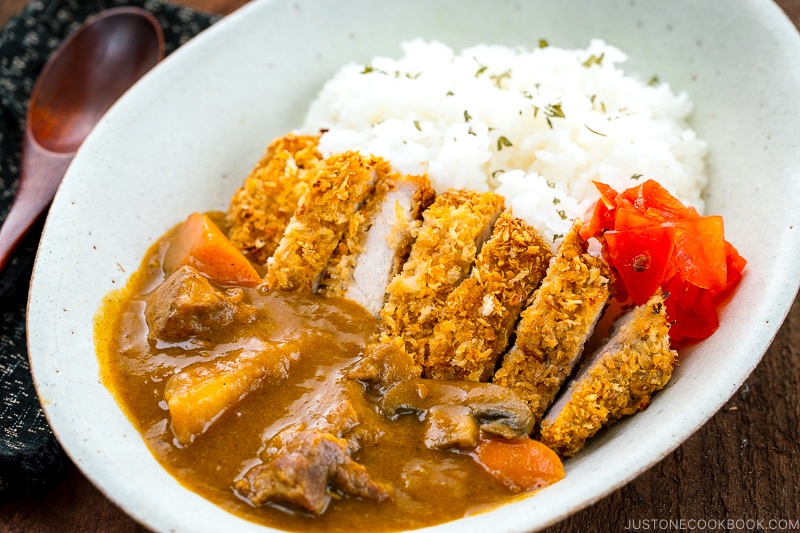
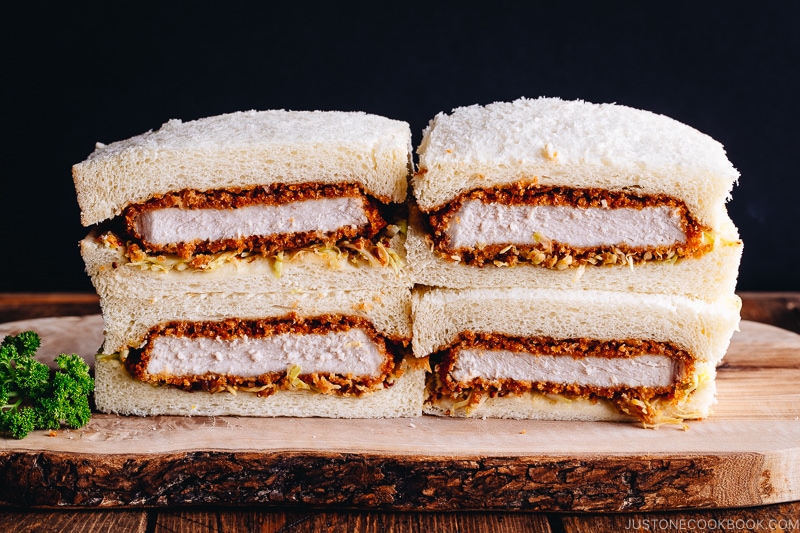
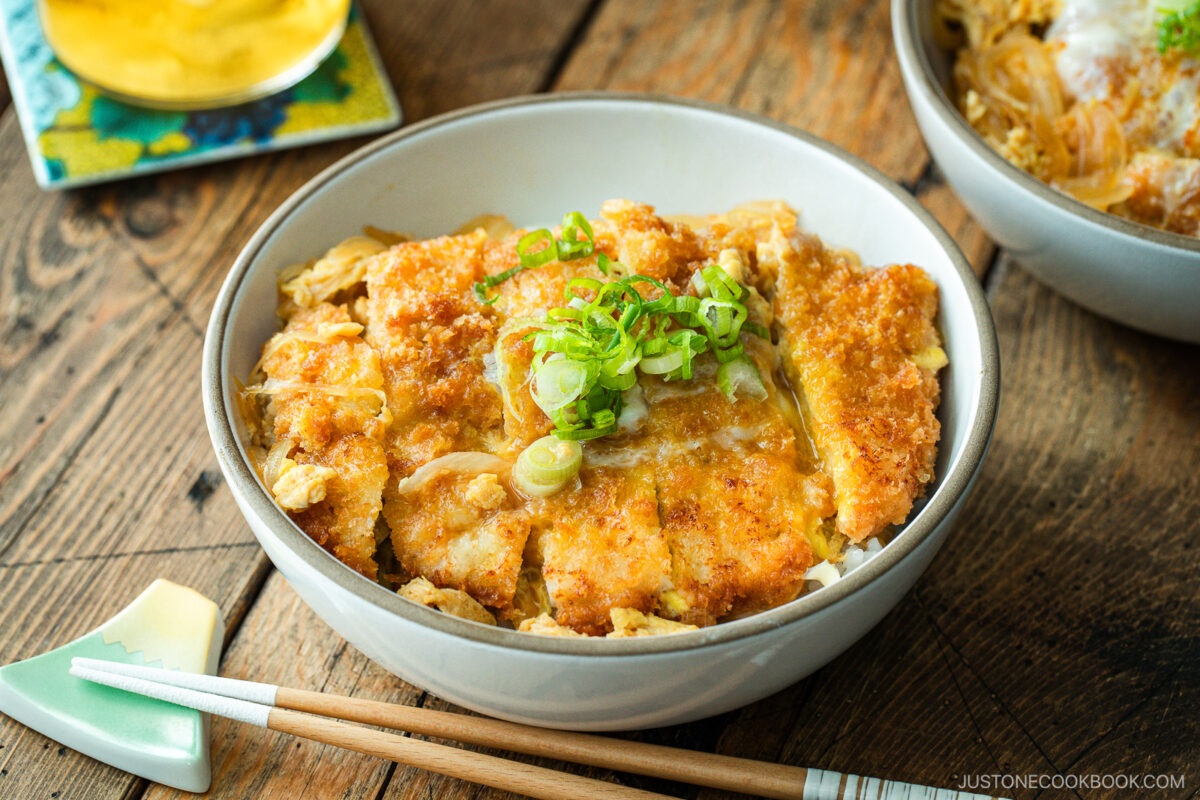
What to Serve with Baked Chicken Katsu
- Shredded cabbage salad with Wafu Dressing or Japanese Sesame Dressing
- Homemade Miso Soup with quick and easy soup stock
- Japanese Pickled Cucumbers
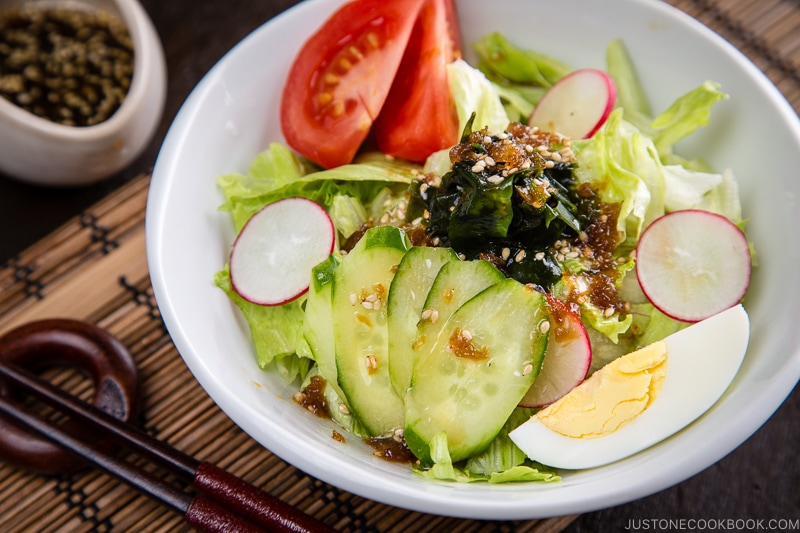
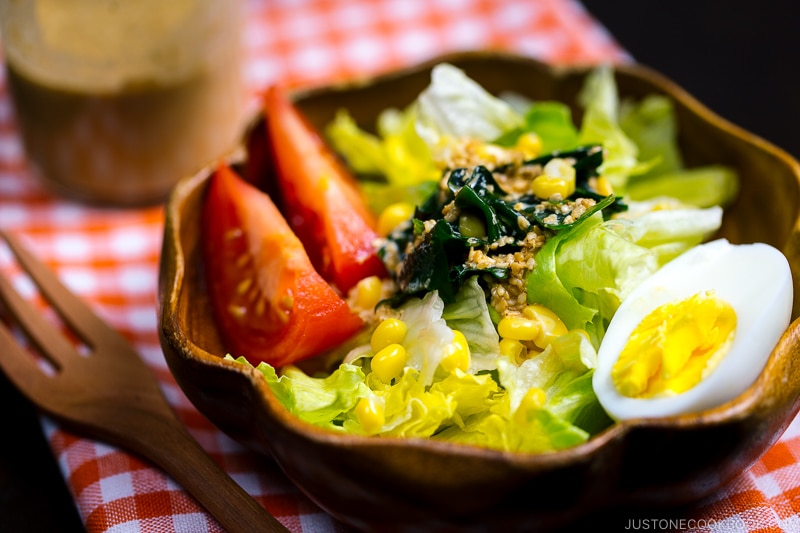
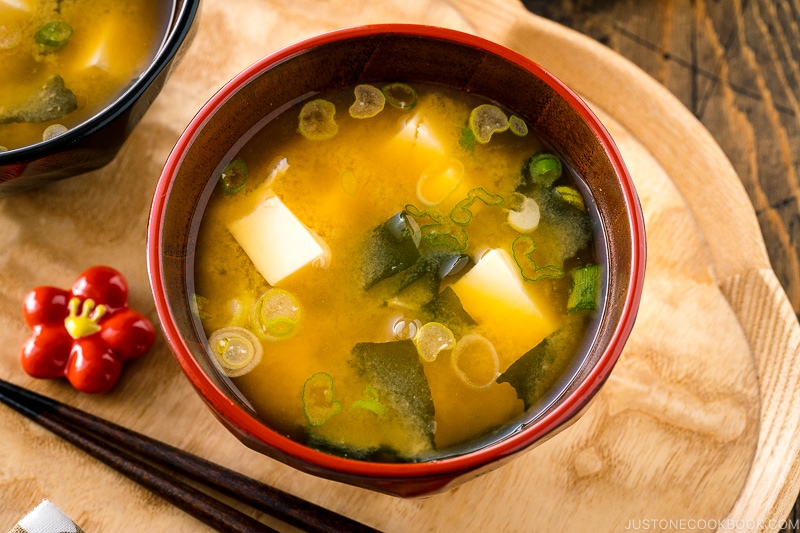
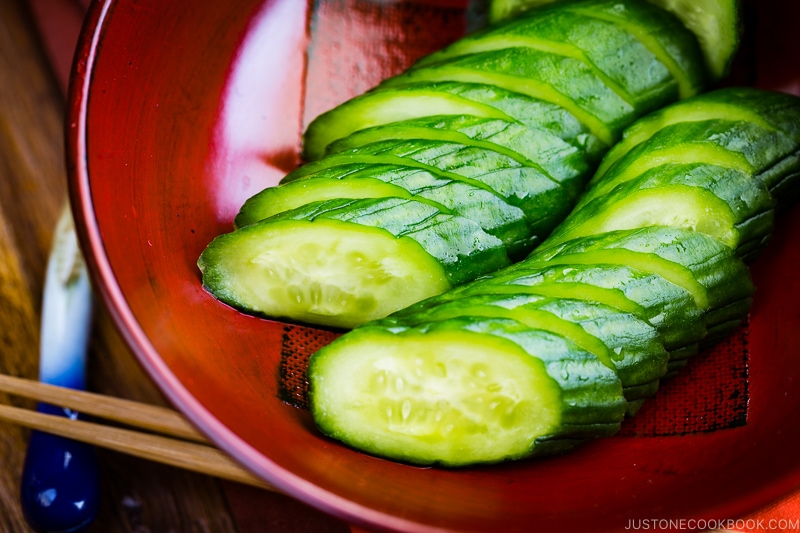 Pickled Cucumber
Pickled CucumberStorage and Reheating Tips
To store: Cool, then refrigerate in an airtight container up to 3 days or freeze up to 1 month.
To reheat: Bake at 350 °F (180 °C) for 15–20 minutes if thawed, or 30 minutes from frozen, until heated through and crispy.
For the Chicken Katsu
- 2 boneless, skinless chicken breasts (1 lb, 454 g)
- Diamond Crystal kosher salt
- freshly ground black pepper
- ¼ cup all-purpose flour (plain flour)
- 1 large egg (50 g each w/o shell) (you may need another egg)
- ½ Tbsp neutral oil
Gather all the ingredients. Adjust an oven rack to the middle position and preheat the oven to 400ºF (200ºC). For a convection oven, reduce the cooking temperature by 25ºF (15ºC).
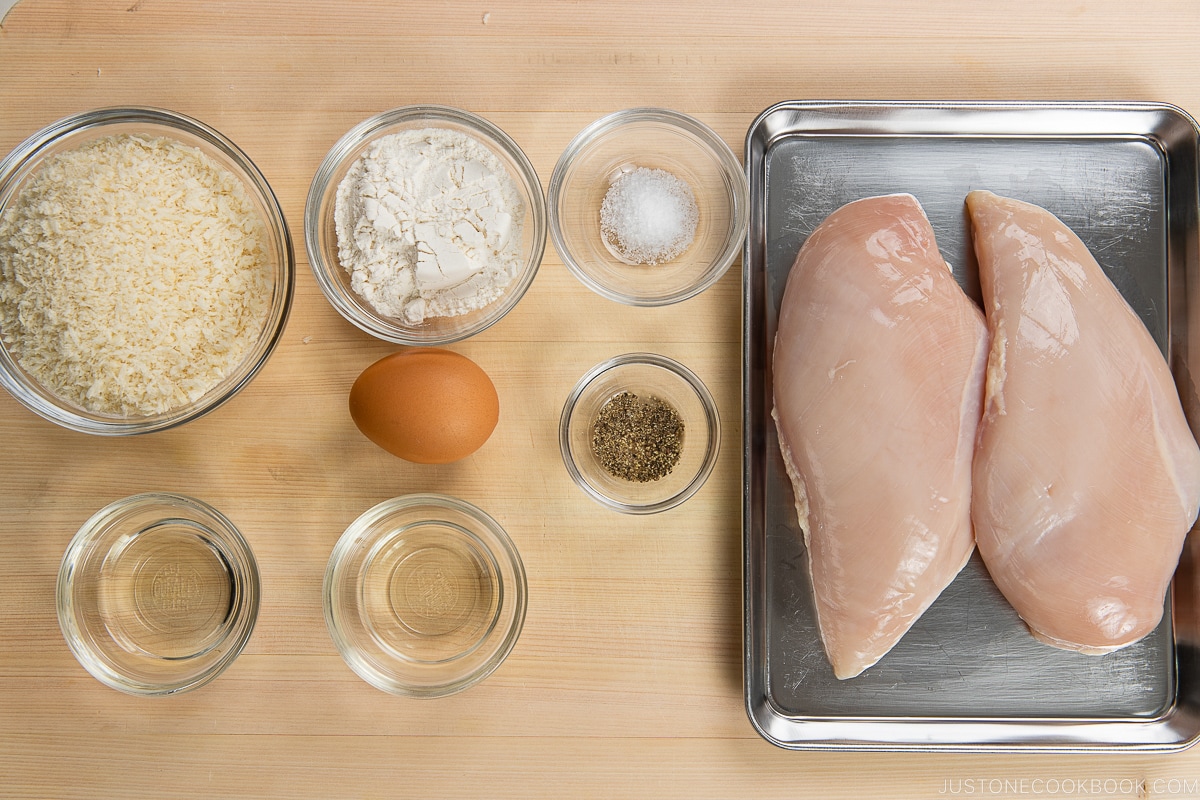
To Toast the Panko
Combine 1¼ cups panko (Japanese breadcrumbs) and 1 Tbsp neutral oil in a frying pan.
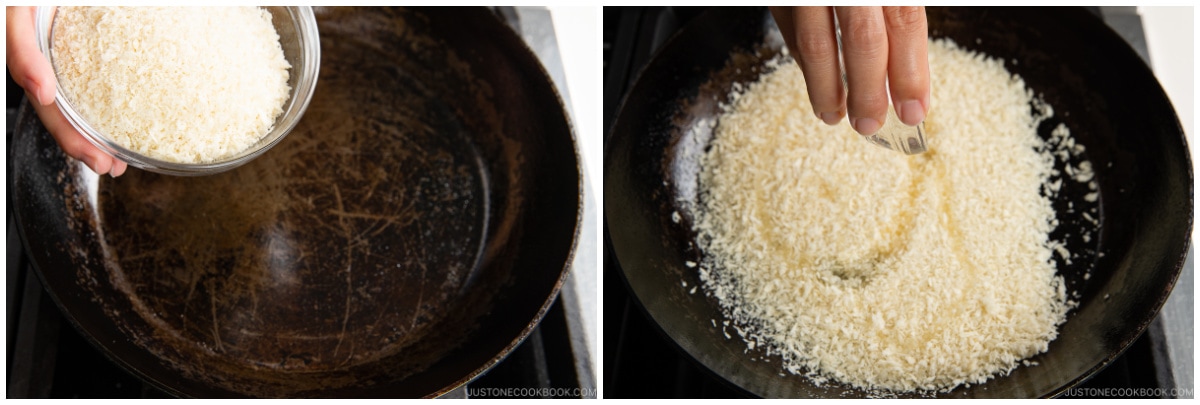
Toast the panko over medium heat, stirring frequently, until golden brown.
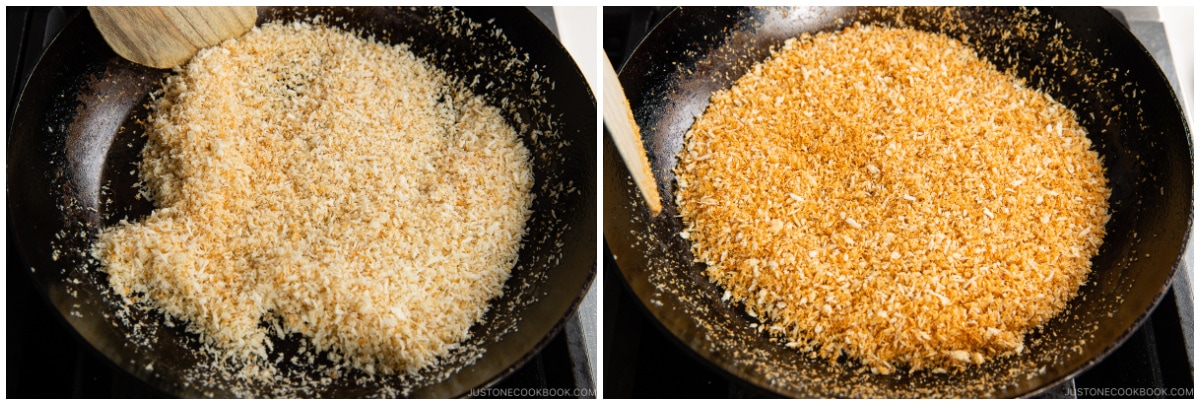
Transfer the toasted panko to a prep tray or shallow dish and cool.
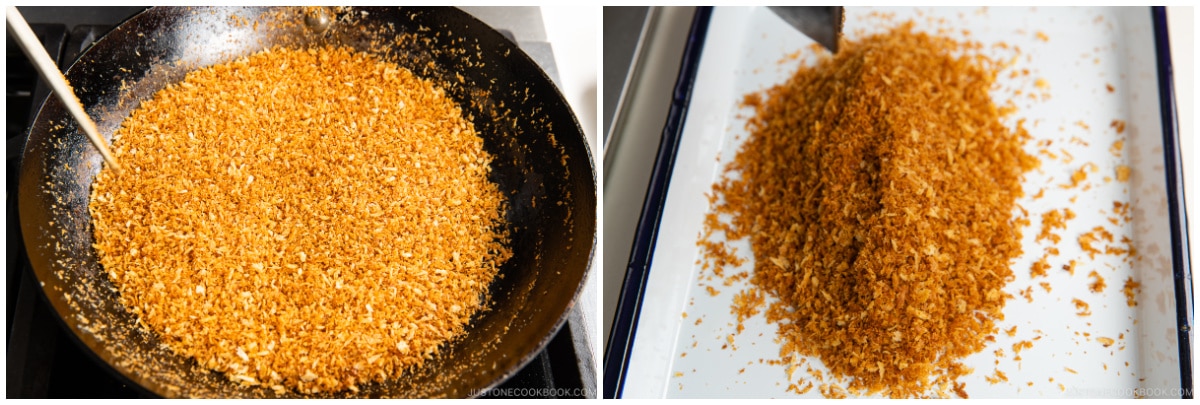
To Butterfly the Chicken
We‘ll butterfly 2 boneless, skinless chicken breasts using the Japanese cutting technique Kannon biraki (観音開き). With a sharp knife, score the chicken breast lengthwise along the top center line, cutting about halfway through the thickness of the breast; do not cut completely through.
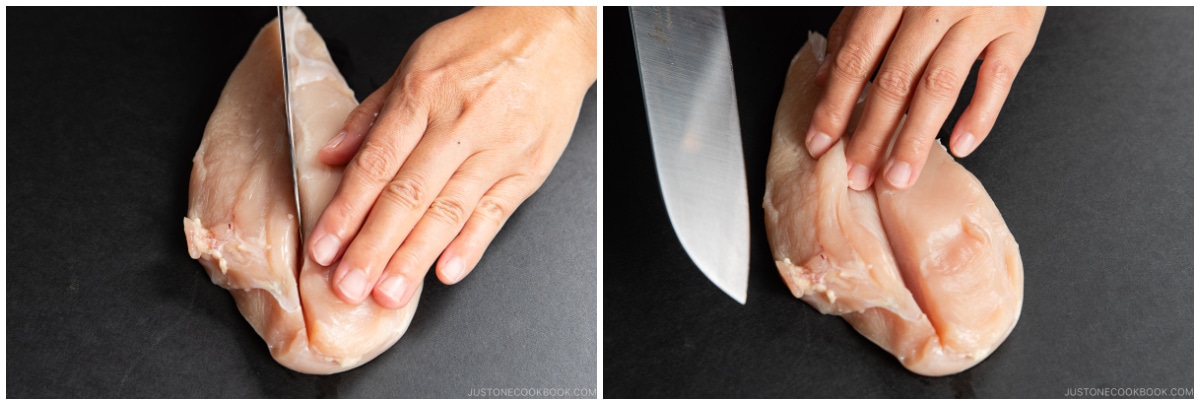
Then, turn the knife parallel to the cutting board and slice the chicken breast from the center toward the left side (or the right side, if you‘re left-handed) to make it evenly thin. Stop before you cut all the way through the edge; then, open it like a book. Imagine we‘re creating a French door here.
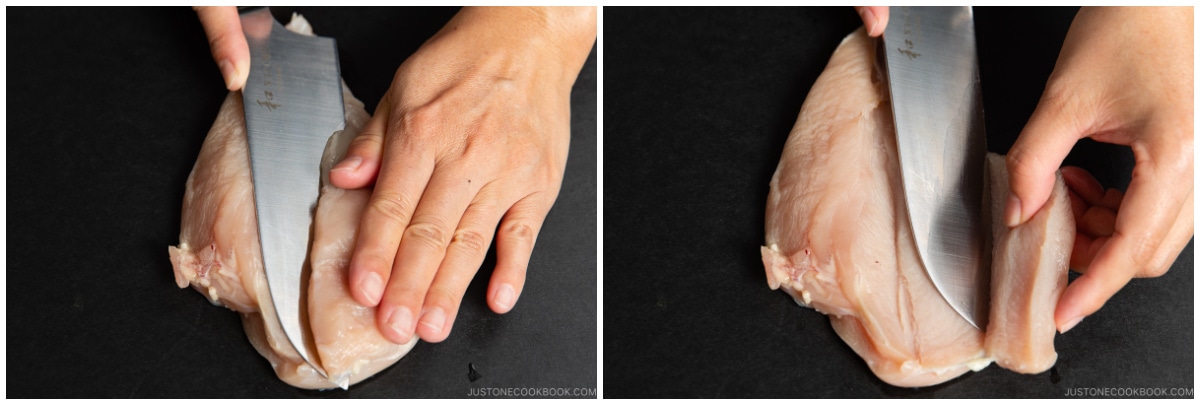
Rotate the breast 180 degrees and butterfly the second side in the same manner from the center toward the left (if you hold the knife in your right hand), creating another “door.“
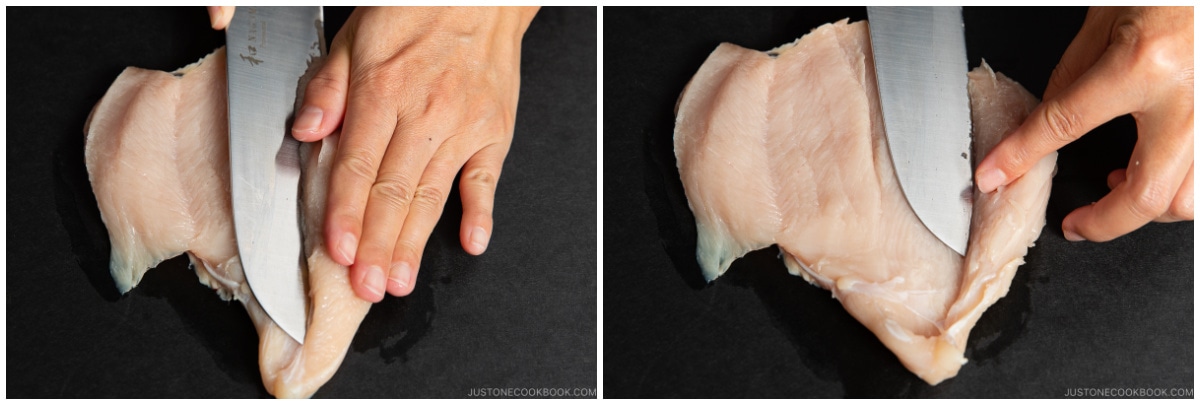
Cut the butterflied breast in half down the center. Now, you have two pieces. Butterfly the remaining chicken breast in the same manner. Next, using a meat mallet or rolling pin, pound the chicken cutlets to an even thickness, about ¼–½ inch (6 mm–1.3 cm).
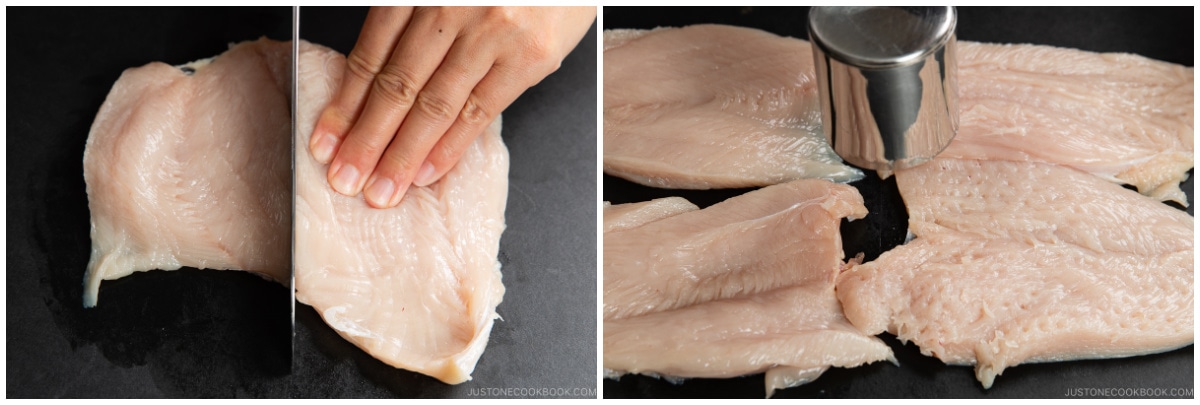
To Bread the Chicken
Season both sides of the cutlets with Diamond Crystal kosher salt and freshly ground black pepper.
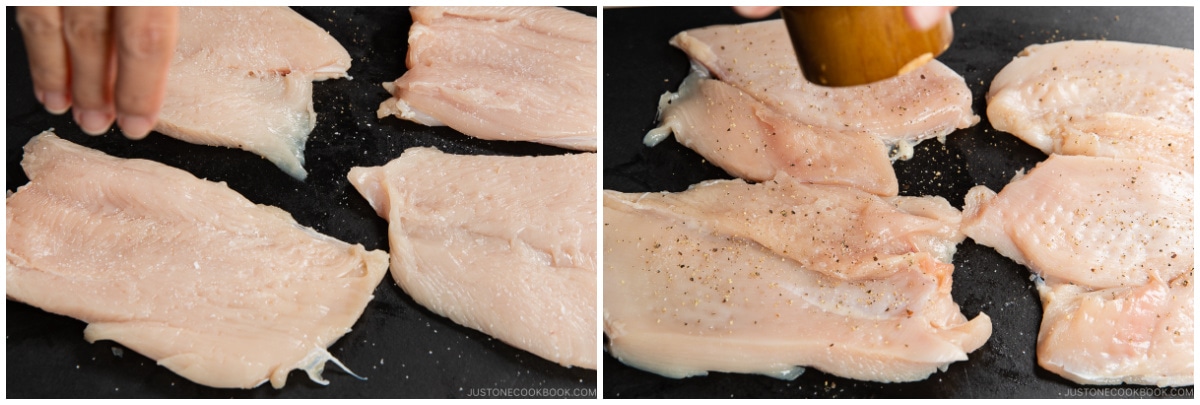
Set up the breading station. In a prep tray or shallow dish, whisk together 1 large egg (50 g each w/o shell) and ½ Tbsp neutral oil. In a second tray, place ¼ cup all-purpose flour (plain flour). Line up the toasted panko as the third tray. Tip: By adding oil to the egg, the breading won't detach from the meat while cooking. It will also help seal in the chicken's juices and flavor.
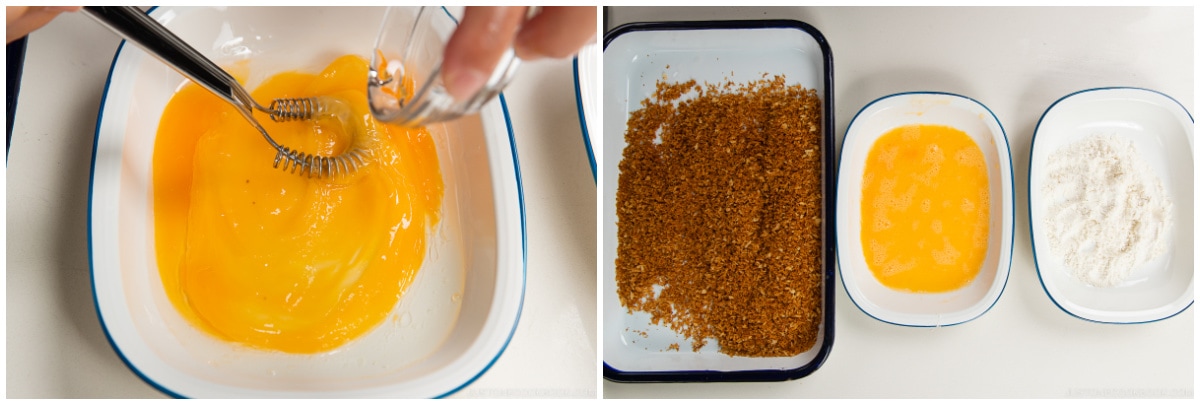
First, dredge a chicken cutlet in the flour and shake off any excess. Next, dip the floured chicken into the egg mixture and coat well on both sides.
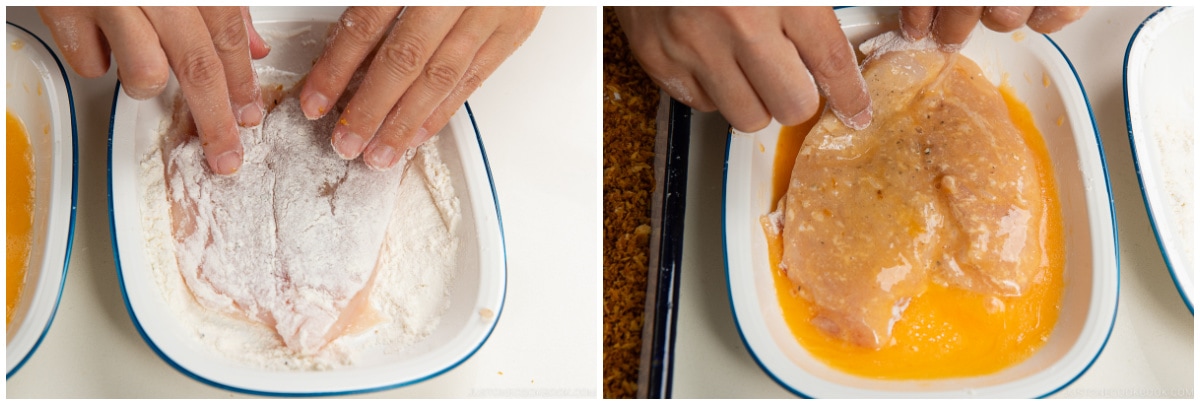
Finally, coat the chicken with the toasted panko, pressing firmly to ensure that it adheres well. Set aside. Bread the remaining cutlets.
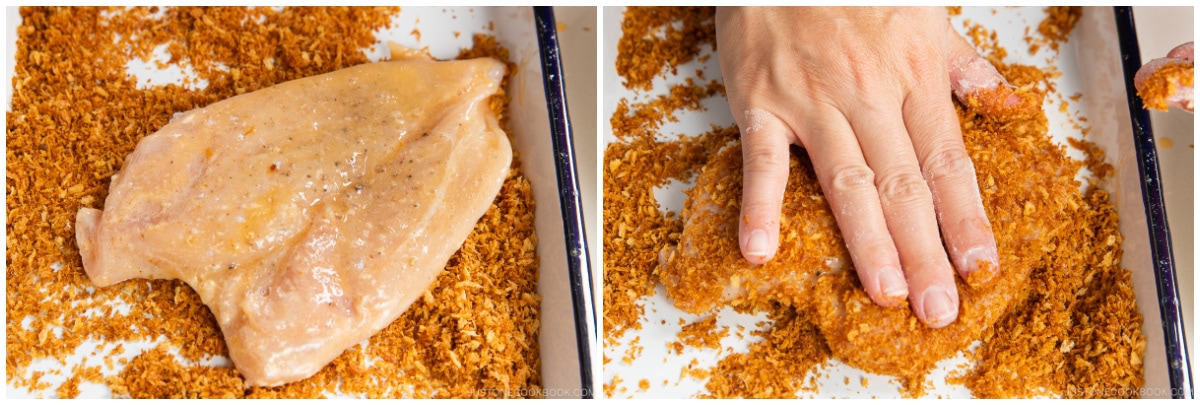
To Bake
Put the breaded chicken cutlets on a wire rack placed on a rimmed baking sheet. Bake at 400ºF (200ºC) for about 25–30 minutes.
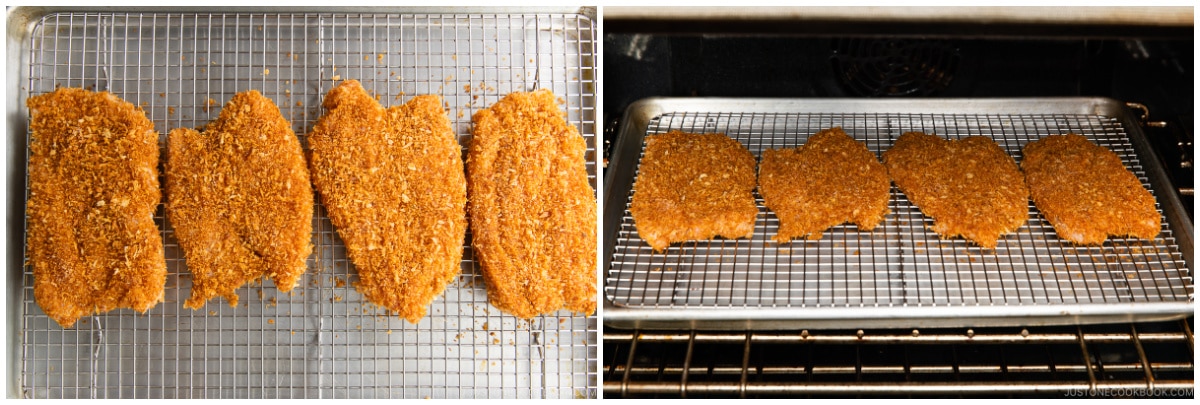
When the internal temperature of the chicken reaches 165ºF (74ºC), it‘s done. Remove from the oven and cut into ¾-inch (2-cm) slices.
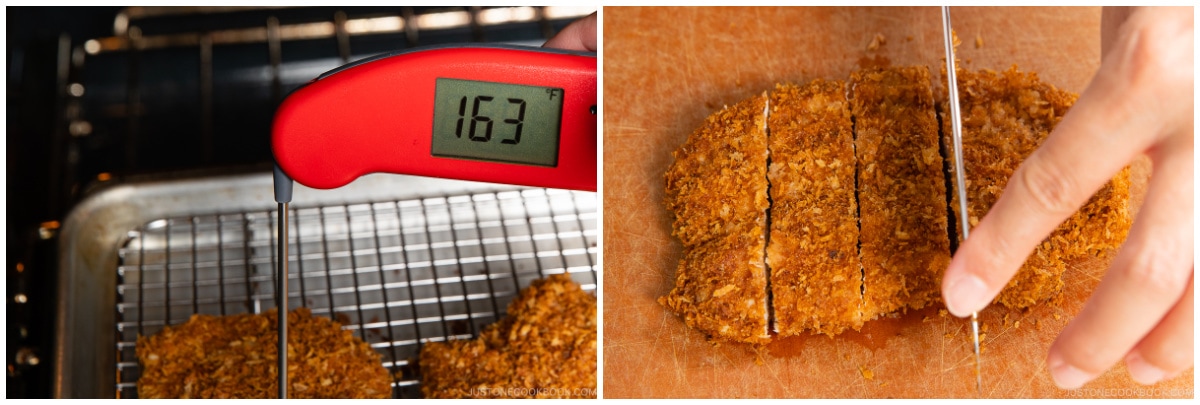
To Serve
Serve with a shredded cabbage salad (I like to use a handy cabbage slicer; you can find it on Amazon and JOC Goods), tomato wedges, and cucumber slices with a side of my Wafu Dressing or Japanese Sesame Dressing. Drizzle tonkatsu sauce over the Chicken Katsu to enjoy!
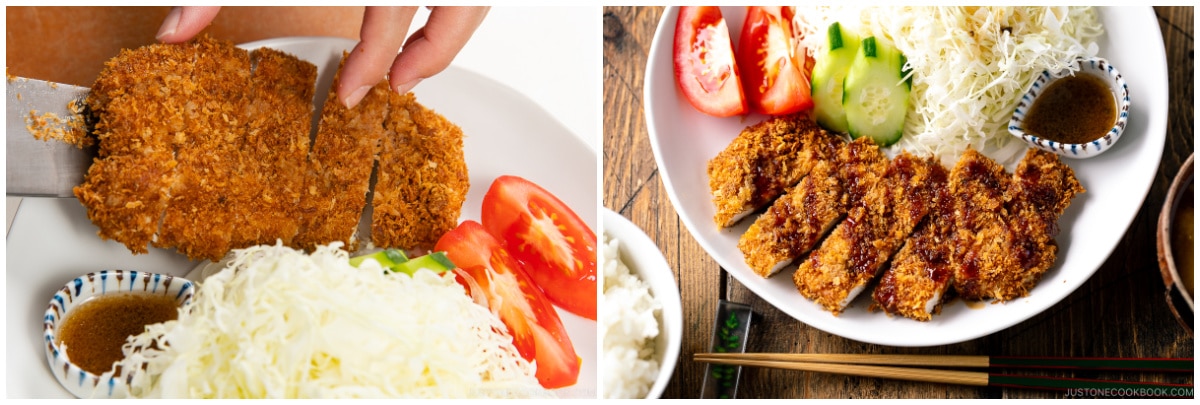
To Store
You can keep the leftovers in an airtight container and store in the refrigerator for up to 3 days or in the freezer for a month. To reheat, bake at 350ºF (180ºC) for 15–20 minutes for baked katsu that was thawed in the refrigerator overnight, or for 30 minutes if heating directly from frozen. Check that the inside is warm before serving.
Calories: 231kcal, Carbohydrates: 12g, Protein: 28g, Fat: 7g, Saturated Fat: 2g, Polyunsaturated Fat: 1g, Monounsaturated Fat: 3g, Trans Fat: 1g, Cholesterol: 119mg, Sodium: 240mg, Potassium: 463mg, Fiber: 1g, Sugar: 1g, Vitamin A: 102IU, Vitamin C: 1mg, Calcium: 34mg, Iron: 1mg
Did you make this recipe?
Tag @justonecookbook on Instagram so we can see your delicious creation!
Editor’s Note: This post was originally published on October 27, 2013. It was updated with new images on September 26, 2022, and republished with more helpful information on July 23, 2025.





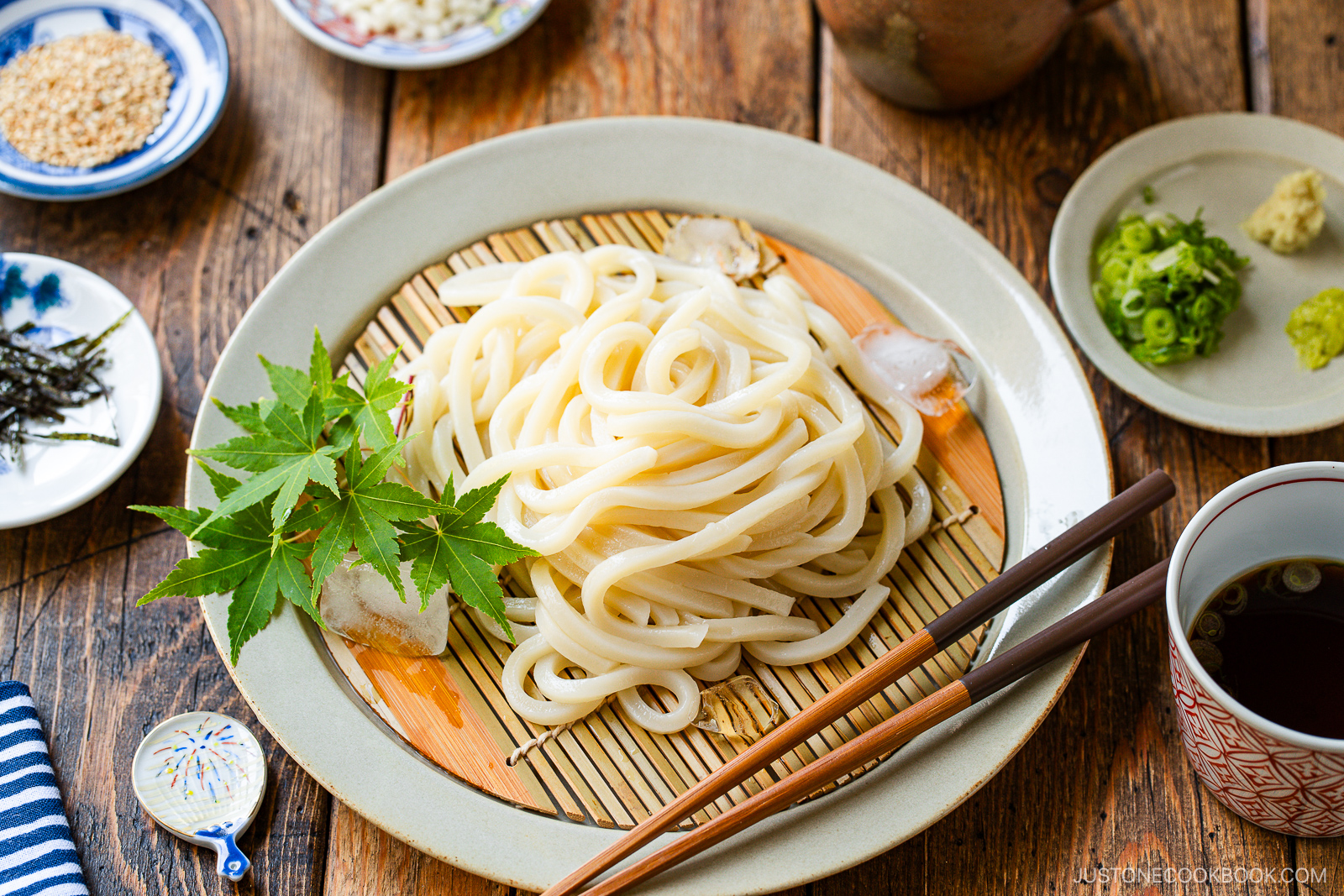

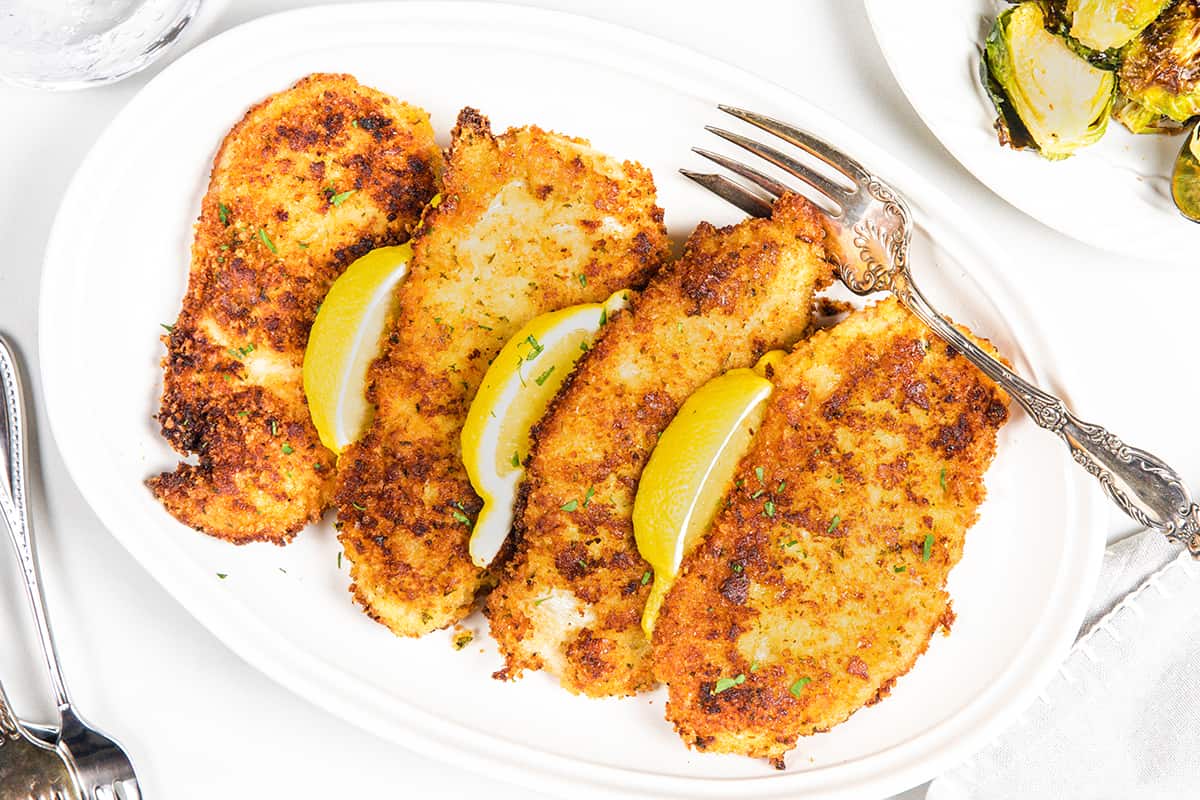
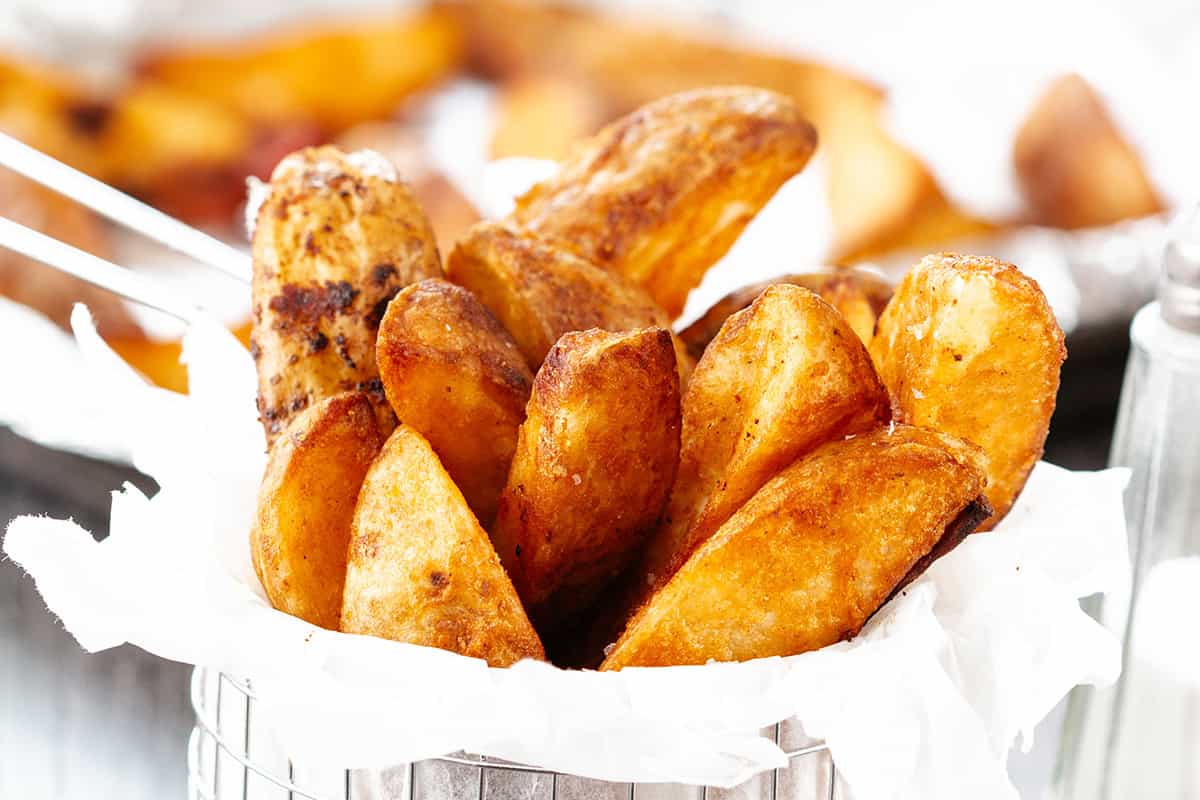
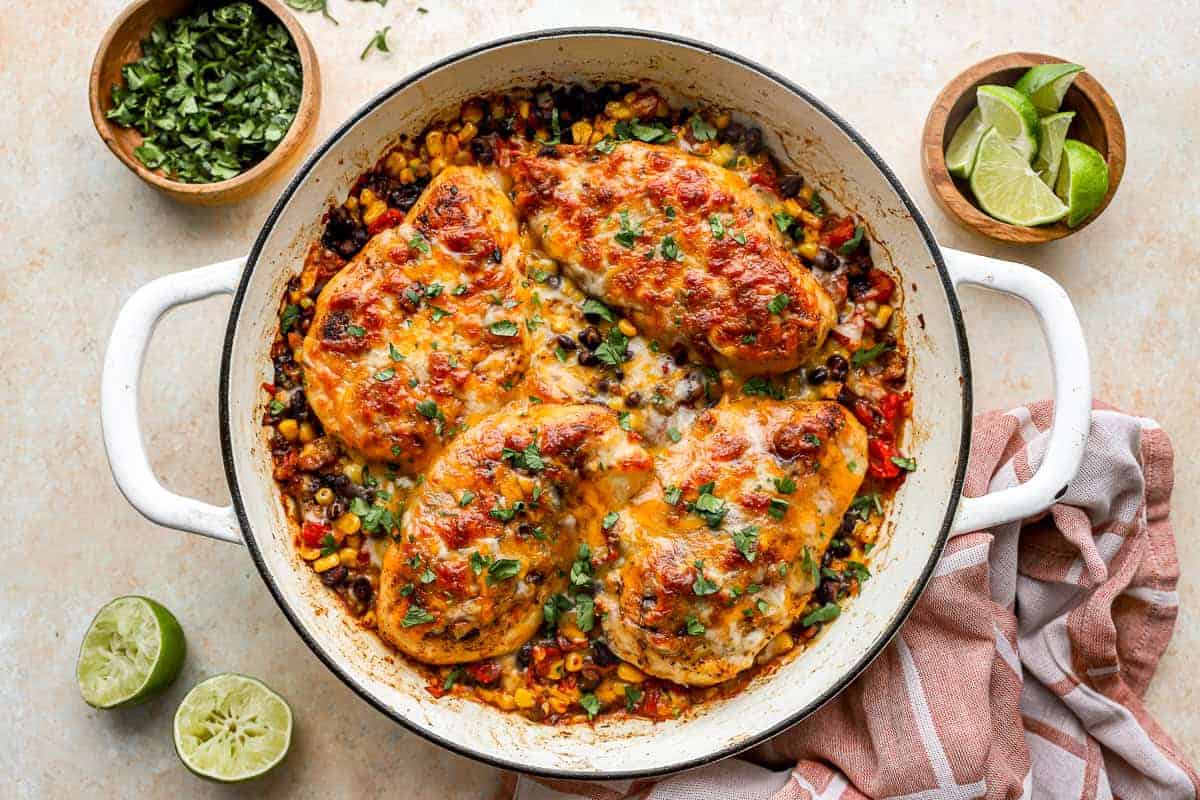

 English (US) ·
English (US) ·